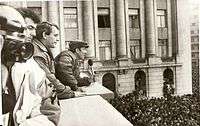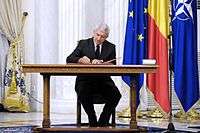Mircea Diaconu
| Mircea Diaconu MEP | |
|---|---|
.jpg) Mircea Diaconu while playing in Enigmatic Variations (Toronto, April 2011) | |
| Born |
24 December 1949 Vlădești, Argeș County, Romania |
| Nationality | Romanian |
| Occupation | actor, politician |
| Political party | National Liberal Party (2008-2014) |
| Spouse(s) | Diana Lupescu |
Mircea Diaconu (Romanian pronunciation: [ˈmirt͡ʃe̯a diˈakonu]; born 24 December 1949) is a Romanian actor and politician.
Biography
Acting, writing, Revolution
Born in Vlădești, Argeș County, he graduated high school in Câmpulung in 1967 and Bucharest's Caragiale Academy of Theatrical Arts and Cinematography in 1971. He made his theatrical debut a year before graduating, at the Bulandra Theater, in Truman Capote's The Grass Harp. His screen debut came in Dan Pița's Nunta de piatră (1972); he would later appear in the same director's Filip cel Bun (1975). Other directors with whom he has worked include Alexandru Tatos (Mere roșii, 1975; Secvențe, 1982; and Secretul armei secrete, 1988), Virgil Calotescu (Buletin de București, 1982; and Căsătorie cu repetiție, 1985), Nae Caranfil (Asfalt Tango, 1996; and Filantropica, 2002) and Cătălin Mitulescu (The Way I Spent the End of the World, 2006). In all, he has appeared in more than sixty films.[1]
Diaconu worked with Lucian Pintilie both in film (the 1981 De ce trag clopotele, Mitică?) and in theater: Gogol's The Government Inspector at Bulandra, and Shakespeare's As You Like It at the Nottara Theater. Liviu Ciulei hired him at Bulandra in 1972, and he remained there for a decade, before moving on to Nottara. At Bulandra, he appeared in Twelfth Night and The Tempest, both under Ciulei's direction; and in Marin Sorescu's Răceala, directed by Dan Micu. At Nottara, he appeared in Alexander Ostrovsky's The Forest; Ultimul bal, after Liviu Rebreanu's Forest of the Hanged; and Mihai Ispirescu's Într-o dimineață. He became the director of Nottara Theater in 2004, working as such until his resignation in 2011.[1]

A participant in the Romanian Revolution, he was rehearsing a play at Nottara when Nicolae Ceaușescu's final speech began on 21 December 1989. During the day, he and his colleagues organized students to go to area factories and urge workers to declare an immediate strike. He spent the night outdoors with students, believing that, although the uprising lacked familiar leaders who could be trusted, the crowd at least recognized popular actors' faces. During the night, Securitate secret police fired through apartment windows, while the next morning, Diaconu saw that agents had quietly killed people with brass knuckles. However, he soon noticed that a revolution was in full swing, the boulevards leading to the city center packed with advancing workers who had trapped two tanks, one of which he rode to the Central Committee building from which Ceaușescu had spoken the previous day.[2] Later, he was among several figures to appear before a microphone in Palace Square. Addressing a throng chanting anti-Ceaușescu slogans, he repeated an appeal for calm.[3]
In 1990 he became the country's first actor to resign his contract with a theater and become a freelancer. Other theaters with which he has appeared include Theatrum Mundi and the National Theatre Bucharest. He taught acting at his alma mater between 1977 and 1978, and again from 1991 to 1998. He wrote three books that appeared under the Communist regime.[1] The first, Șugubina (1977), is a volume of short stories. The second, La noi, când vine iarna, was initially published as a children's book in 1980 and was republished as a novel for adults in 2013. The third, Scaunul de pânză al actorului (1985), includes sketches about the theatrical world.[4] He was obliged to join the Romanian Communist Party during his second year of university, due to the high grades he had achieved.[5]
Politics

He began his political career in 2008, when he was elected to the Senate for Argeș County as a member of the National Liberal Party (PNL).[1] While there, he served on the culture committee;[5] his term expired at the following election.[6] In May 2012, he was named Culture Minister in the new Victor Ponta cabinet,[1] but was forced out of office the following month when the High Court of Cassation and Justice ruled there was a conflict of interest between his ministerial position and his managerial role at the theater.[7]
In March 2014, when the PNL failed to include him on its list of candidates for that year's European Parliament election, Diaconu decided to run as an independent.[8] Although his candidacy was initially rejected by the electoral authorities because the 2012 court decision had found him ineligible for political office, an appeals court placed him on the ballot, finding that he could in fact run for other offices than the one involved in the older case (that is, Senator). During the campaign, he built up the image of an independent persecuted by bureaucratic institutions determined to keep him out of office, benefiting from favorable media coverage.[9] He won some 380,000 votes or 6.8% of the national total (ahead of two political parties that won seats), assuring him a term as an MEP.[10] As an independent, he was only required to win 3.1% of the vote in order to secure a seat; he obtained double digits in the counties of Constanța (13.3%) and Botoșani (10.4%).[9] He is thought to have significantly eroded the PNL vote, with one party member, Nicolae Robu, claiming Diaconu cut its performance by nearly half.[11] In the European Parliament, he sits with the Alliance of Liberals and Democrats for Europe Group,[12] and is vice president of the Culture Committee.[13]
In 1980 he married Diana Lupescu, herself an actress; the couple have two children.[1][14] In 2012, he was the subject of an investigation by prosecutors for having helped hire her as a director at Nottara in 2007, despite the fact that she did not meet the necessary qualifications.[15]
References
- 1 2 3 4 5 6 (Romanian) "Actorul Mircea Diaconu, propus la şefia Ministerului Culturii, la finalul unui mandat de senator marcat de conflicte", Adevărul, 1 May 2012; accessed 26 May 2014
- ↑ Mark Frankland, The Patriots' Revolution: How Eastern Europe Toppled Communism and Won Its Freedom, p.328-29. I.R. Dee, 1992, ISBN 978-156663-035-1
- ↑ Petre Țurlea, Din culisele Parlamentului României: 1990-1992, p.9. Editura Globus, 1994, ISBN 978-973490-053-4
- ↑ (Romanian) Bianca Burța-Cernat, "Iernile vrajbei noastre", Observator Cultural, nr. 701/November 2013; accessed 27 May 2014
- 1 2 (Romanian) "Mircea Diaconu, la Ministerul Culturii, la finalul unui mandat de senator nelipsit de conflicte", România Liberă, 1 May 2012; accessed 26 May 2014
- ↑ (Romanian) Profile at the Romanian Chamber of Deputies site; accessed 26 May 2014
- ↑ (Romanian) Cristian Câmpeanu, "Mircea Diaconu nu mai poate fi ministru", România Liberă, 18 June 2012; accessed 26 May 2014
- ↑ (Romanian) "Mircea Diaconu şi-a dat demisia din PNL. Va candida ca independent la europarlamentare", România Liberă, 19 March 2014; accessed 26 May 2014
- 1 2 (Romanian) Romulus Georgescu, "Mircea Diaconu, rol jucat la perfecție", România Liberă, 26 May 2014; accessed 26 May 2014
- ↑ (Romanian) "Rezultate parțiale alegeri europarlamentare", Mediafax, 26 May 2014; accessed 26 May 2014
- ↑ (Romanian) "Nicolae Robu (PNL): Mircea Diaconu aproape că a înjumătăţit scorul PNL", Jurnalul Național, 26 May 2014; accessed 26 May 2014
- ↑ (Romanian) "Mircea Diaconu face parte din grupul ALDE, dar îşi menţine statutul de independent", Jurnalul Național, 25 June 2014; accessed 18 September 2014
- ↑ (Romanian) Ioana Tomescu, "Mircea Diaconu a fost ales vicepreşedinte al Comisiei de cultură şi educaţie din Parlamentul European", Evenimentul Zilei, 7 July 2014; accessed 18 September 2014
- ↑ (Romanian) Corina Zorzor, "Mircea Diaconu: 'Fiecare carte a mea corespunde unui concediu medical'", Adevărul, 24 November 2013; accessed 27 May 2014
- ↑ (Romanian) Andrei Luca Popescu, "Anchetă extinsă în cazul lui Mircea Diaconu", Gândul, 31 May 2012; accessed 26 May 2014
External links
| Wikimedia Commons has media related to Mircea Diaconu. |